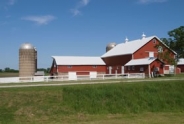Business
 In today's world of rapid change, strong records and business skills are essential for sound decision making and agile maneuvering. There are many helpful resources available. Please contact us for clarification or any additional information that you may be seeking.
In today's world of rapid change, strong records and business skills are essential for sound decision making and agile maneuvering. There are many helpful resources available. Please contact us for clarification or any additional information that you may be seeking. BUSINESS CATEGORIES
Relevant Event
USDA Contract Freezes and Terminations: Legal Action Steps for Farmers
Legal Action Steps for Farmers with Signed EQIP and CSP Contracts
This resource is written for farmers and ranchers nationwide who have a signed contract with USDA NRCS under the EQIP or CSP program for environmental improvements but have concerns that their contract is frozen, under review, or terminated, and who are uncertain of their rights to receive reimbursement as well as their ongoing obligations under the signed contract.
USDA Contract Freezes-Filing and NAD Appeal or Demand Letter
"If you want good employees, be a good employer:"
STATE AGRICULTURE COMMISSIONER ENCOURAGES THE AGRICULTURAL INDUSTRY TO APPLY FOR
Labor Roadshow V
Regional Agricultural Business Development Associate Extension Support Speciali
Tatum Langworthy, Sr. Administrative Assistant
South Central New York Dairy & Field Crops
Updates to the Paycheck Protection Program Extend Access to Small Farms
Rate Your Record Keeping System by Mary Kate (Wheeler) MacKenzie
Mary Kate (Wheeler) MacKenzie was recognized by the National Association of County Agricultural Agents (NACAA) with a national communications award for her feature story on recordkeeping, originally published by Cornell Small Farms Quarterly in January, 2020.
Coronavirus Food Assistance Program (CFAP)
On April 18, Dr. Andrew Novakovic, recently retired but formerly the Director of the Cornell Dairy and Markets Policy Program, sent an update on financial assistance provided by the federal government through the Coronavirus Food Assistance Program (CFAP), including an overview of the program and estimates of the direct payments dairy farmers might receive.
USDA's Latest Dairy Forecast
April 13, 2020 - USDA's official, consensus forecast for agricultural markets, known as the World Agricultural Supply and Demand Estimates (WASDE) report, just came out. Their analysis of dairy market (as of early April) is as follows:
US Dairy Exports Feb 2020
Progress of the Dairy Farm Report 2019
This is the third Progress Report summarizing Selected Financial and Production Factors for 2019 with data from 135 NY farms who participated in the Dairy Farm Business Summary.
Upcoming Events
2026 Cornell Organic Field Crops
March 6, 2026
Waterloo, NY
From Dry to Fresh -- Setting Up Cows for Success
March 18, 2026 : From Dry to Fresh -- Setting Up Cows for Success
Scipio Center, NY
2026 Ag Summit in Cortland NY
March 19, 2026
Cortland, NY
Announcements
Farm Participants Needed for Bale Grazing Grant!
Information on the Project:- Approximately 10 acres total needed to bale graze two different bale densities
- "Core" farms will graze two winters, "Demo" farms will graze one winter.
- Payments for both "Core" farms and "Demo" farms
- Baseline soil sampling by bale grazing team
- Forage measurements in early season by bale grazing team
- Late season clipping if residual not trampled down by farm
Cornell Cow Convos - New Podcast
On-going podcast, New episodes released on the last Thursday of the month.Guest speakers, CCE Dairy Specialists.
Housed on Soundcloud Channel is CCE Dairy Educators
- Preventative healthcare for cows
- The trend of beef on dairy
- What to look forward to in the new year for dairy
- Socially grouping or pair-housing calves
2018 Drug Residue Prevention Manual
For more than 30 years, the U.S. dairy industry has focused educational efforts on the judicious use of antibiotics through the annual publication of a Best Practices Manual. The 2018 edition of the National Dairy FARM Program: Farmers Assuring Responsible Management? Milk and Dairy Beef Drug Residue Prevention Manual is the primary educational tool for dairy farm managers throughout the country on the judicious and responsible use of antibiotics, including avoidance of drug residues in milk and meat.The manual is a quick resource to review those antibiotics approved for dairy animals and can also be used as an educational tool and resource for farm managers as they develop on-farm best management practices necessary to avoid milk and meat residues. Visit the Manual and Form Library to download copies of this important tool!
Follow us on Facebook
The team updates our facebook page frequently - follow us to be updated on our events, see some fun videos and get local area updates!facebook.com/SCNYDairyandFieldCropsTeam
NYSERDA Agriculture Energy Audit Program
NYSERDA offers energy audits to help eligible farms and on-farm producers identify ways to save energy and money on utility bills. Reports include recommendations for energy efficiency measures.For more information and the NYSERDA Agriculture Energy Audit Program Application click here






